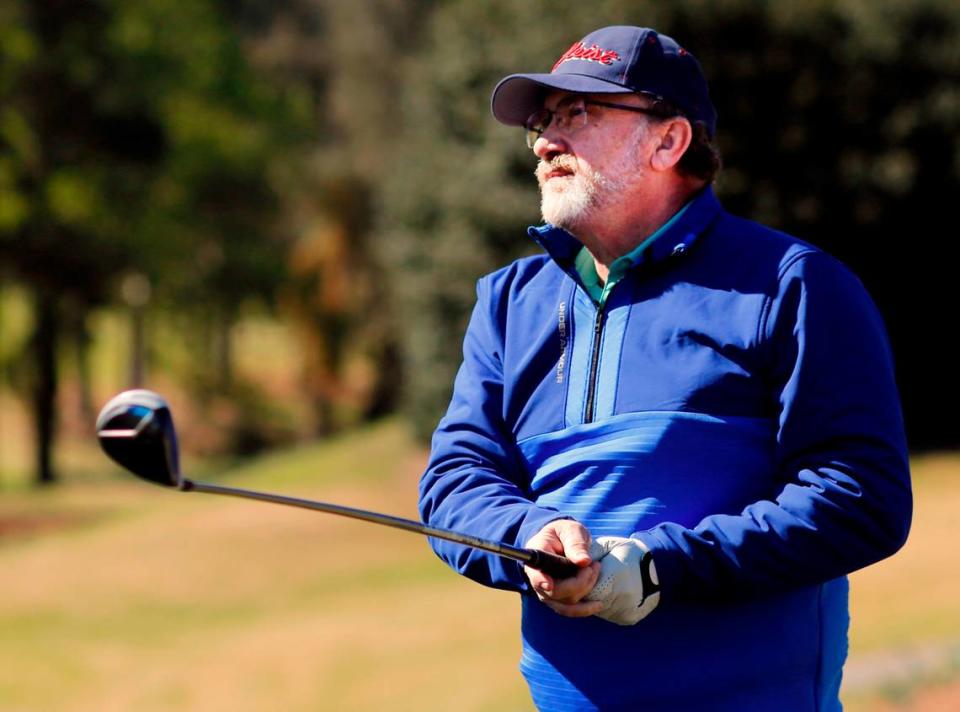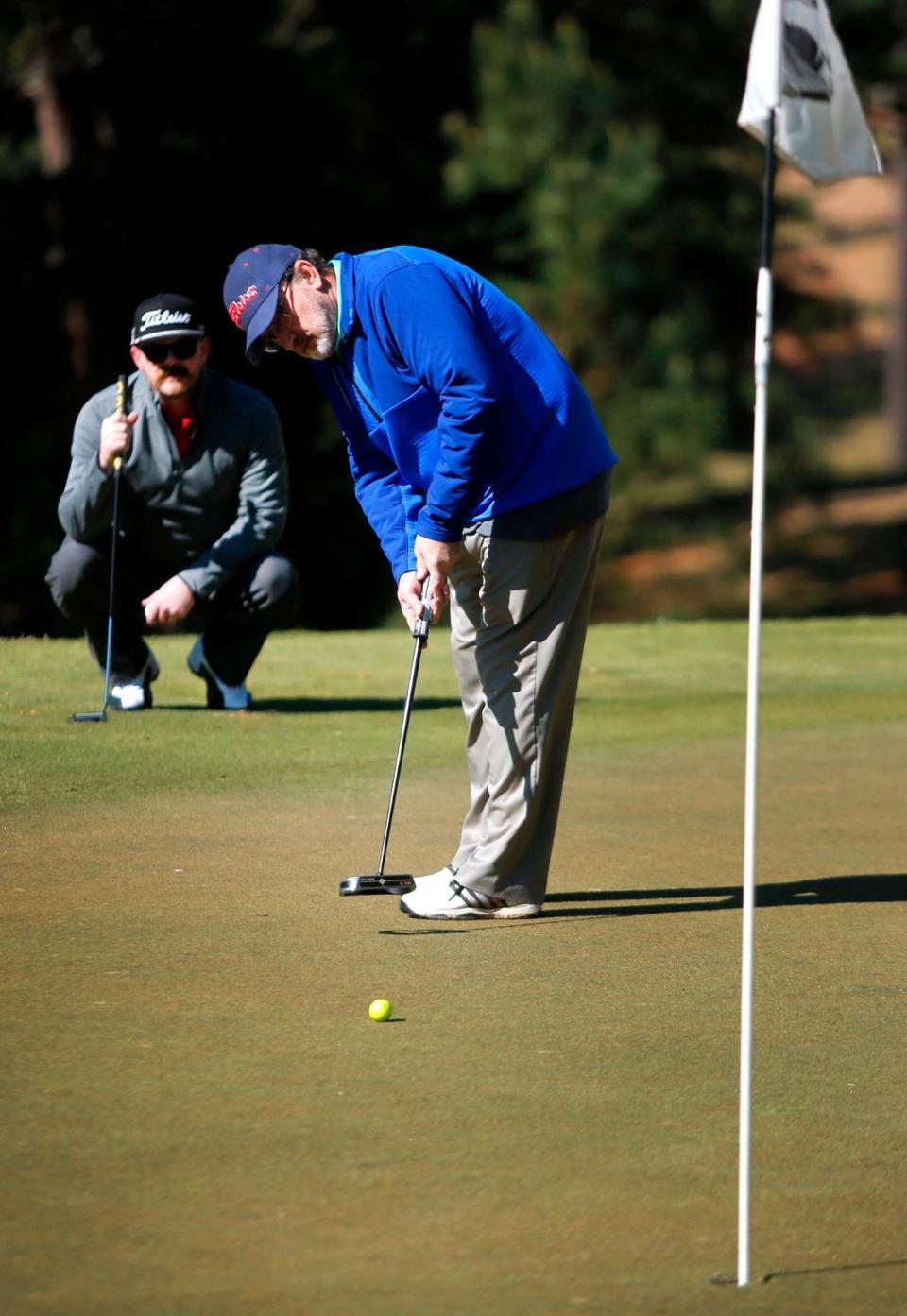Blind golf? Yup, and this father-son duo from Atlanta shows how it’s done in Columbus
The United States Blind Golf Association has enabled Greg Hooper and 71 other active players to continue participating in the game they love.
The added bonus is that the accommodation allowing coaches to aid players during tournaments has enhanced his relationship with his son, Alan.
“There’s just nothing like it,” Greg told the Ledger-Enquirer. “For him to be here, taking off from work and family and the rest of it, it’s just so invaluable. It’s unbelievable.”
They are among the 25 player-coach duos from throughout the United States and Canada competing in the 2023 USBGA U.S. Open March 21 (noon start) and March 22 (11 a.m. start) at Green Island Country Club in Columbus.
Greg Hooper, 65, owns a furniture building business in Atlanta. He has been legally blind for 28 years. He started losing central vision in his right eye when he was 17, then in his left eye when he was 35.
He was diagnosed with pseudoxanthoma elasticum (PXE), a rare genetic disease that causes progressive calcification and fragmentation of elastic fibers in the skin, retina and cardiovascular system.
PXE’s effect on the eyes is similar to macular degeneration, leaving patients with what Greg described as “donut” vision, meaning blindness in the middle of his field of vision and sight only on the periphery.
“When I look down, the ball’s not there,” Greg said. “I had to adjust, hitting the ball by looking 18 inches to 24 inches behind it. … I just try to repeat the swing every single time.”

His son, Alan, 38, is an insurance underwriter, also residing in Atlanta.
“I realized how seldom it happens that fathers and sons get to spend this amount of time with each other,” Alan told the L-E. “… It means the absolute world to me that I get to do this.”
Greg appreciates Alan for putting up with “a grumpy old man all the time.” Alan appreciates Greg for giving him grace when his advice doesn’t pan out. Often, however, it does.
With an 18 handicap, Greg’s average score is around 90. He finished second in his category at last year’s USBGA U.S. Open in St. Augustine, Florida. He also serves as director of this year’s tournament.
Perseverance
Greg and Alan noted much of their success comes from persevering through rough moments. They recalled winning their 2013 Vision Cup at Green Island match even after Greg’s first shot went backward between his legs.
“It just speaks to how difficult it is,” Alan said.
So when those tough times comes, they rely on their friendship, developed by flipping the dynamic so the father can accept advice from the son.
“Because of our relationship, I have zero problem giving that trust up at all,” Greg said. “… I totally trust him to tell me what I’m going to do.”
Greg added, “I know when I mess up because either a towel is coming at a rapid speed by me or he doesn’t say anything. … There’s never really a time where I want to blame him for anything because I know it’s tough reading greens and things like that.”
Alan explained, “Usually, if I’m quiet when he hits the ball, it’s because I have to concentrate on watching where it goes.”
Their partnership goes beyond the golf course.

“We’re very close friends,” Alan said. “I mean, we’re father and son, but even outside of golf, we have a very close relationship. We call each other for advice.”
Communication
Alan admitted they get aggravated with each other, but they know how to overcome it.
“It’s just about communicating, knowing how one another communicates and then just recovering when it may not go as planned,” Alan said.
So when he sees their relationship produce success on the golf course, Alan said, “it’s one of the best things ever. … It’s amazing. It’s exhilarating. It’s emotional. It’s a lot.”
That’s why the coach gets a trophy along with the player.
Last year in London, while representing the United States at an all-adaptive tournament, they trailed by one hole in the match-play format going into the final hole. They faced a 31-foot putt for a tie.
Alan read the putt for three to four minutes. He also called his father off the ball to readjust him. Then it seemed like it took the putt forever to get there, Greg said — and he couldn’t see or hear it drop — but he knew the result from the roar of the crowd.

“Those are the type of situations where we have worked and sweated all day long and reaped the reward,” Greg said. “… It was an incredible experience.”
“When you feel like you have that weight of responsibility on your shoulders, competing for your nation, it changes things,” Alan said. “Knowing how bad we struggled that day, the fact that we even had an opportunity to tie it was a miracle. … That putt probably took five seconds to hit the bottom of the cup. When it did, there was just audible gasps. I couldn’t believe it.”
U.S. Blind Golf Association rules
Blind golf is played under nearly the same Rules of Golf governing regular golf. The exception is that blind golf is a team sport, allowing a coach (also called an aide) to join a player on the course as they compete against other duos. A caddie is allowed as well.
Rule 25.2 defines the modifications for blind players to allow help with aiming, a limited exception to the prohibitions on touching sand in bunker with a club and help with lifting, dropping, placing and replacing a ball.
The coach (or aide) can help the player with taking a stance, aim before the stroke and advice about strategy.
Any player whose vision can’t be corrected to better than 20/200 in both eyes is eligible to play in blind golf events. The USBGA and International Blind Golf Association have three sight categories for players:
B1 players are totally blind, defined as the inability to differentiate between a blank sheet of white paper and a sheet of white paper with a black symbol on the official form.
B2 players are able to recognize the shape of a hand up to the visual acuity of 20/600.
B3 players have a visual acuity better than 20/600 but less than 20/200.
Columbus Sports Council
The Columbus Sports Council is organizing this event. The council has hosted three previous blind golf tournaments (2011 U.S. and International association championships and the 2013 Vision Cup), plus the 2013 Beep Baseball World Series.
“All this ties back to the sports council’s mission, bringing people here through sport,” Columbus Sports Council executive director Merri Sherman told the L-E. “… These athletes are staying in our hotels, eating in our restaurants, going to our local shops. So there are a lot of resources being pumped into our economy here.”
Sherman praised Green Island Country Club and Country’s Barbecue for helping to host the tournament.
“The folks here at Green Island are incredible,” she said. “The staff, they’re operating a doggie daycare here today for some of the (blind golfers’) guide dogs. Every little detail has been worked out. Country’s Barbecue will welcome all the athletes tonight at a celebration. So it’s a lot of collaboration to make these athletes feel very welcomed here in Columbus. Ultimately, that’s why they decided to come back, because of our hospitality.”

 Yahoo Movies
Yahoo Movies 
